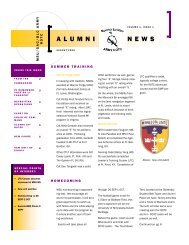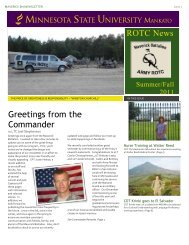Winter 2012 Partnership Magazine - College of Education Home ...
Winter 2012 Partnership Magazine - College of Education Home ...
Winter 2012 Partnership Magazine - College of Education Home ...
Create successful ePaper yourself
Turn your PDF publications into a flip-book with our unique Google optimized e-Paper software.
After the last full school year <strong>of</strong><br />
collaboration, the Redesign team foresaw<br />
a need to make the assessment accessible<br />
to all its users, that this would ensure timely<br />
collaboration and a full understanding <strong>of</strong> the<br />
requirements as they relate to practice. So<br />
this summer 18 teacher education faculty and<br />
K-12 school educators developed an online<br />
module complete with multimedia resources,<br />
documents, and tools.<br />
“The goal is to make expectations for<br />
the TPA clear throughout coursework and in<br />
our teaching,” says Kitty Foord <strong>of</strong> the K-12/<br />
Secondary Programs department.<br />
Five teams covered<br />
the initial four tasks <strong>of</strong> the<br />
assessment with a team “<br />
overseeing the technology<br />
use. Each team gathered a<br />
mix <strong>of</strong> materials to address<br />
the objectives, measures,<br />
evaluations, and resources<br />
for each task, including<br />
sample videos and student<br />
work in specific applications. Additional<br />
resource files were added for technology and<br />
literacy issues.<br />
Now, both teachers and students include<br />
resources from their current curriculum in<br />
<strong>Winter</strong> <strong>2012</strong> <strong>Partnership</strong><br />
the module. This is gradually building learning communities particular to districts and school<br />
buildings, which in turn affects faculty instruction with the assessment and opportunities for<br />
more development. Meanwhile, four Pr<strong>of</strong>essional Learning Teams use the module as a base<br />
from which educators extend applications to their practices that arise in their discussions <strong>of</strong> the<br />
assessment, and the meetings provide a forum for reporting the results.<br />
Learning Teams<br />
As new curricula emerge and morph with current practice, educators from across<br />
institutions accepted a call for collaboration in creating common, effective teaching practices.<br />
Over 30 teaching faculty and K12 teachers began meeting regularly this fall to build<br />
knowledge and practice with topics they collectively identified last fall in surveys and focus<br />
groups as important to their schools and classrooms. Seven teams cover areas such as the TPA,<br />
differentiation, and co-teaching this fall, and expect to add more learning teams reviewing<br />
mental health and/or technology in spring <strong>2012</strong>.<br />
We’re learning to use differentiation<br />
as a tool, not merely as a generalized concept,<br />
because the bottom line is<br />
what’s useful for us in the classroom,<br />
said Jeff Pribyl.<br />
”<br />
Curriculum Area Lead, Kitty Foord, commented,<br />
“We can’t transform practice, or integrate theory or<br />
ideas or learning, without ongoing, job-embedded<br />
development to support it.”<br />
Some groups meet face-to-face, which in many<br />
cases means transportation to and from common<br />
destinations, while others meet in online forums<br />
at least four times over the semester. Jeff Pribyl, a<br />
Chemistry content area pr<strong>of</strong>essor, meets with two<br />
elementary educators from Le Sueur-Henderson and<br />
Assistant Director <strong>of</strong> the Office <strong>of</strong> Field & International Experience,<br />
Laura Bemel, to discuss differentiation strategies.<br />
“We’re learning to use differentiation as a tool, not merely as a<br />
generalized concept, because the bottom line is what’s useful for us<br />
in the classroom,” Pribyl said.<br />
The Learning Teams are based on K-12 Pr<strong>of</strong>essional<br />
Learning Community empirical research, which focuses on<br />
ongoing development, diverse membership, fostering<br />
collaborative relationships, and meeting diverse<br />
needs. Pribyl added, “To be able to use or know the<br />
material, we must talk to people who are using it<br />
regularly.” He said it’s more effective when each<br />
<strong>of</strong> them think specifically about instructional<br />
techniques they use in their own courses.<br />
The team found a common resource in a<br />
book called The Differentiated Classroom,<br />
and members alternate teaching each other<br />
about the material through the lens <strong>of</strong> their<br />
own practices, which can come through life<br />
experiences as well as classroom environments.<br />
The development <strong>of</strong> these resources and<br />
practical strategies will inform the practice <strong>of</strong><br />
future teachers and education faculty, so a common<br />
language and understanding surrounds the flux <strong>of</strong> its<br />
practice. In an agile response to this flux, the Learning<br />
Teams’ success depended partly on the participants’ ability<br />
to extend learning into increased collaborations in their<br />
respective environments.<br />
Educators from the <strong>College</strong> <strong>of</strong> <strong>Education</strong> and related<br />
content areas mixed with K-12 educators from Mankato,<br />
St. Peter, Le Sueur-Henderson, and Sibley East school<br />
districts. If you’re curious about participating in upcoming<br />
Learning Teams or would like to catch up on the learning<br />
and products that have come out <strong>of</strong> current teams,<br />
talk to your PDS colleagues. They could be TOSA’s,<br />
administrators, teachers, or pr<strong>of</strong>essors, and they’re willing<br />
to share.<br />
15




